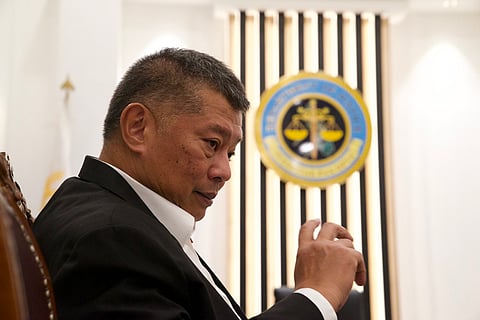
- NEWS
- the EDIT
- COMMENTARY
- BUSINESS
- LIFE
- SHOW
- ACTION
- GLOBAL GOALS
- SNAPS
- DYARYO TIRADA
- MORE

Justice Secretary Jesus Crispin Remulla wants immediate action to address pressing issues particularly overcrowding which is currently the problem of jail facilities in the country.
"The gravity and urgency of these challenges need not be stressed, and the utmost importance of our collective efforts to face them cannot be overstated. Overcrowded corrections and detention facilities compromise the very essence of the corrections system, pose systematic challenges that ripple across our criminal justice system, and unduly transgress our PDLs' basic human rights," Remulla stated in his address, delivered by Justice Undersecretary Raul Vasquez, during the National Jail Decongestion Summit in Manila.
The DOJ chief pointed out in the message read by Vasquez that the summit offers the government and stakeholders a unique chance to resolve these issues within the corrections system.
"Today, however, we have a unique opportunity—the opportunity to pioneer innovative approaches to decongest our jails and prisons, possibly review the reintegration process, and improve and develop our existing justice system in ways that are not only efficient but also compassionate," Remulla said.
He stressed that the summit will serve as a convergence point for policymakers, corrections practitioners, justice sector professionals, academics, and civil society representatives.
The summit aims to decongest jail facilities with the help of the UNODC (United Nations Office on Drugs and Crime) as well as GOJUST (Governance in Justice) which funded the two-day event where stakeholders, experts, and several government agencies were represented.
The facilities of both the Bureau of Corrections (BuCor) and Bureau of Jail Management and Penology (BJMP) have an average congestion rate of almost 400 percent.
During the summit, President Ferdinand Marcos Jr. urged Congress to make the proposed legislations as priority bills that include the diversion of adult offenders, the unified penology act, the creation of the Department of Corrections and Penology, the law on re-integration and psychosocial rehabilitation, and amendment to the Recognizance Act of 2012.
It will also outline three proposed activities and strategies such as reducing prison admissions, increasing inmate releases upon completing their sentences, and expanding jail facility capacity.
